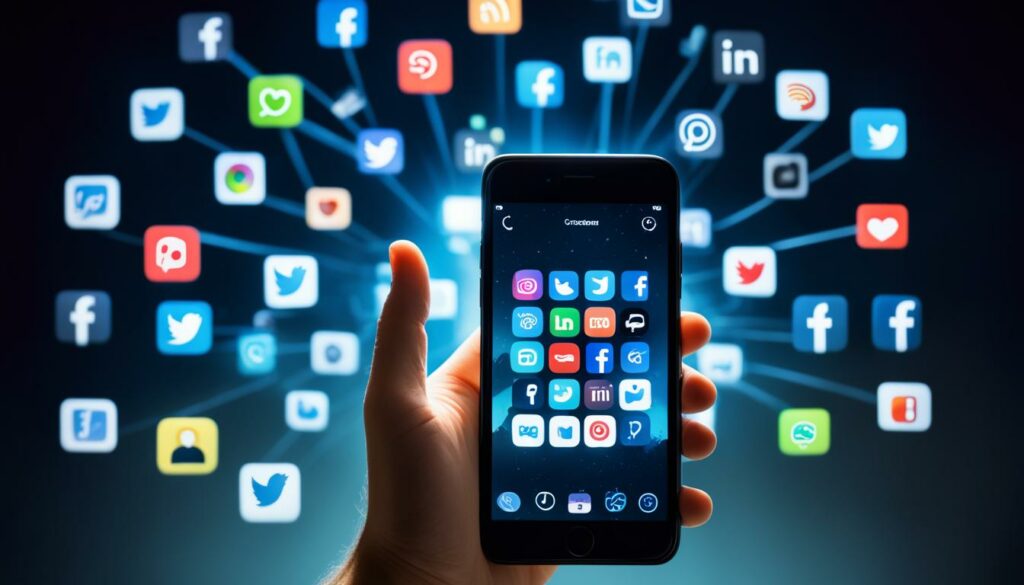Understanding Teen Social Media Addiction
Welcome to our article on understanding teen social media addiction. In today’s digital age, it’s no surprise that many teenagers find themselves addicted to social media platforms like Facebook, Twitter, and Instagram. But why are teens so drawn to these virtual spaces, and what impact does this addiction have on their lives?
Teen social media addiction refers to a preoccupation and obsession with virtual platforms, where addicted teens spend excessive amounts of time engaging in online activity. They often prioritize virtual connections over real-life relationships, which can hinder their social growth and impact their sense of identity and self-esteem.
Join us as we explore the dominant characteristics of social media addiction in teenagers, discuss alarming statistics on teen social media addiction, delve into the causes behind this addiction, and examine its effects on the adolescent brain and behavior. We will also explore treatment options for social media addiction and strategies for helping teens adjust to an offline world.
Key Takeaways:
- Social media addiction in teenagers is characterized by a preoccupation and obsession with virtual platforms.
- Teens addicted to social media prioritize virtual connections over real-life relationships, hindering their social growth.
- 92% of teenagers go online every day, with 24% being online ‘almost constantly’.
- Teenagers may become addicted to social media due to feelings of overwhelm, loneliness, boredom, stress, or anxiety.
- Social media addiction can have negative impacts on self-esteem, mental health, and overall well-being.
Dominant Characteristics of Social Media Addiction in Teens

When it comes to social media addiction in teens, there are two primary characteristics that dominate: excessive time spent online and a strong desire to engage in virtual activities. Addicted teenagers often find themselves glued to their screens, constantly scrolling through their feeds, seeking validation through ‘likes’ and comments.
One of the key characteristics is the incessant need to check for updates, post content, and remain active on various platforms. This constant need for virtual engagement drives addicted teens to prioritize their online presence over their real-life relationships, resulting in a detrimental impact on their interpersonal connections.
“Spending excessive amounts of time online and seeking validation through ‘likes’ can lead to a decline in social skills and hinder the development of authentic connections.”
As teenagers succumb to social media addiction, they often lose sight of the importance of building meaningful relationships offline. The allure of virtual interactions overshadows the value of face-to-face conversations and personal connections. This preoccupation with the online world can lead to a significant negative impact on their real-life relationships, causing strain and distance.
Without realizing it, addicted teens may miss out on important milestones, events, and quality time with family and friends. This detachment from reality can further isolate them and hinder their ability to develop authentic connections and social skills.
The consequences of social media addiction in teens are profound and should not be underestimated. Striking a balance between the virtual and real world is essential for healthy growth, as it allows teenagers to engage authentically with others and build meaningful relationships that can withstand the test of time.
Statistics on Teen Social Media Addiction
Understanding the prevalence of social media addiction among teenagers is crucial in addressing this growing concern. Let’s take a closer look at some eye-opening statistics:
-
92% of teenagers go online every day: A vast majority of teens (92%) are active internet users, engaging with various online platforms on a daily basis.
-
24% of teens are online ‘almost constantly’: A significant portion of teenagers (24%) admit to being online ‘almost constantly’, indicating a high level of dependence on digital devices and social media platforms.
-
Majority engage with popular social media platforms: Teens are particularly drawn to widely-used social media platforms such as Facebook, Instagram, Snapchat, and Twitter. These platforms provide avenues for self-expression, socializing, and sharing content.
-
77% of teens are distracted by their devices during social interactions: Parents report that a staggering 77% of teens are often distracted by their mobile devices when spending time with others, indicating how social media addiction can affect real-life connections.
-
50% of teens believe they are addicted to their mobile devices: Half of the teenagers surveyed express a belief that they are addicted to their mobile devices. This self-awareness highlights the extent of the issue and the need for appropriate solutions.
These statistics underscore the widespread influence and impact of social media on the lives of teenagers. It is imperative to address the addictive nature of social media and develop strategies to promote healthy usage and digital well-being among teens.
Causes of Teenage Social Media Addiction

Teenagers can develop addiction to social media for various reasons. The allure of virtual platforms can provide an escape from real-life challenges, offering a sense of belonging and connection. Here are some common causes of social media addiction in teens:
- Feeling Overwhelmed: Social media can serve as a distraction and a way to cope with overwhelming emotions or stress.
- Loneliness: Teens who feel isolated or lack social connections may turn to social media for virtual companionship.
- Boredom: The constant availability of content on social media provides entertainment and fills empty time.
- Stress and Anxiety: Social media can offer a temporary relief from the pressures of daily life, providing a virtual escape.
For shy teens, social media platforms may offer an avenue for self-expression and communication that is less intimidating than face-to-face interactions.
“Social media can become a safe space for shy teens to share their thoughts and opinions without the fear of judgment or rejection.” – Dr. Emma Johnson, Adolescent Psychologist
Additionally, the quest for validation and acceptance plays a significant role in social media addiction. The number of ‘likes’ and comments on posts can become an obsession for teenagers seeking external validation:
“The constant pursuit of ‘likes’ and comments creates a cycle of seeking validation, which can reinforce addictive behaviors.” – Dr. Sarah Richards, Teen Mental Health Expert
Understanding the underlying causes of teenage social media addiction is crucial in developing effective intervention strategies. By addressing these causes and providing alternative ways for teens to fulfill their emotional needs, we can help them break free from the grips of social media addiction and lead healthier, more balanced lives.
Is Social Media Addiction the Sign of a Disorder?

Social media addiction can have significant implications for mental health, particularly in individuals who already have underlying disorders such as ADHD, depression, anxiety, and oppositional defiant disorder. The constant need for positive feedback and validation from the virtual world can perpetuate the addiction cycle, exacerbating symptoms of these conditions.
Children and teenagers who feel isolated or unhappy are particularly vulnerable to developing social media addictions as a way to escape their emotions. This reliance on virtual connections as a source of comfort and validation can further isolate them from real-life interactions, hindering their emotional growth and well-being.
Studies have shown a strong correlation between social media addiction and mental health issues. The excessive use of social media platforms can contribute to increased rates of depression, anxiety, self-harm, and substance abuse among teenagers. The relationship between social media addiction and mental health is intricate, as both can fuel each other in a vicious cycle.
“The constant need for positive feedback and validation from the virtual world can perpetuate the addiction cycle, exacerbating symptoms of underlying mental health disorders.”
It is crucial to recognize that social media addiction alone is not classified as a disorder in the Diagnostic and Statistical Manual of Mental Disorders (DSM-5). However, excessive and compulsive use of social media can amplify symptoms and have a profound impact on an individual’s mental health. It is essential to address both the addiction and any underlying mental health conditions to achieve holistic and effective treatments.
To gain a better understanding of the relationship between social media addiction and mental health, let’s take a look at the following table:
[table]
These statistics highlight the significant impact social media addiction can have on mental health, underscoring the need for early intervention and comprehensive treatment approaches.
The relationship between social media addiction and mental health is a complex issue that requires further research and understanding. However, it is evident that excessive use of social media can contribute to and exacerbate existing mental health conditions. By recognizing the signs of social media addiction and addressing both the addiction and any underlying disorders, we can support individuals in achieving healthier relationships with technology and promoting their overall well-being.
How Social Media Addiction Affects the Adolescent Brain

Social media addictions can have a profound impact on the brain, specifically its chemical processes. One key aspect affected is the release of dopamine, a neurotransmitter associated with pleasure and reward. When a teenager receives positive feedback on social media, the same reward circuits in the brain are activated as when they win money or eat chocolate.
This activation of reward circuits creates a cycle of desire for more positive feedback, leading to increased posting, checking, and watching. The constant need for validation and positive reinforcement from social media platforms drives teenagers to seek more intense rewards. This can result in a heightened vulnerability to developing other addictions as the brain craves more intense stimulation.
Research studies have shown that social media addiction impacts the brain’s reward system, leading to changes in behavior and the brain’s response to pleasurable stimuli. The constant dopamine release caused by social media engagement can lead to a reinforcement loop, making it increasingly difficult for teens to resist the allure of virtual interactions.
To illustrate the impact of social media addiction on the adolescent brain, consider the following table:
| Effects of Social Media Addiction on the Adolescent Brain | Consequences |
|---|---|
| Increased dopamine release | Desire for continuous validation and positive feedback |
| Altered reward circuitry | Heightened susceptibility to developing other addictions |
| Changes in behavior | Impaired decision-making and prioritization of virtual interactions |
This image depicts the intricate connection between social media addiction and the adolescent brain. It serves as a visual representation of how social media can hijack the brain’s reward system, leading to addictive behaviors and potentially negative consequences.
It is crucial to understand the impact of social media addiction on the brain to effectively address and combat this growing concern. By recognizing the role of dopamine and its influence on behavior, parents, educators, and mental health professionals can develop strategies to mitigate the adverse effects of social media addiction and provide support for teenagers seeking to regain control of their virtual lives.
How Does Social Media Addiction Affect Teens?
Social media addiction directly impacts a teen’s brain processes and can have significant negative effects on various aspects of their life. Teens who prioritize creating an idealized virtual image often experience a decrease in overall life satisfaction and self-esteem. Constantly comparing themselves to others online can lead to a decline in self-esteem and an increased risk of depression, eating disorders, self-harming behaviors, and substance abuse.
The constant engagement with social media also prevents teens from fully engaging in real-world activities, hindering their ability to relax and rest. This lack of balance can further contribute to feelings of anxiety, stress, and a distorted sense of self-worth.
“As teens spend more and more time on social media, they become increasingly absorbed in a curated, filtered reality,” says Dr. Emily Martin, a child psychologist specializing in adolescent behavior. “This constant exposure to carefully constructed images and highlight reels can create unrealistic expectations and fuel a perpetual cycle of comparison and insecurity.”
The Impact on Self-Esteem and Self-Image
The constant stream of carefully crafted images and highlights on social media can lead teens to develop unrealistic expectations about their appearance, achievements, and lifestyle. This can be particularly damaging to their self-esteem and self-image, as they may feel the need to meet unattainable standards set by influencers and their peers.
Teenagers often compare themselves to the seemingly perfect lives portrayed on social media, which can result in feelings of inadequacy and a diminished sense of self-worth. This constant exposure to idealized versions of others can make them believe that their own lives are inferior, further impacting their self-esteem.
According to a survey conducted by the National Eating Disorders Association, 65% of individuals experiencing an eating disorder reported that social media influenced their perception of beauty, body image, and weight.
The Cycle of Validation and Approval
Social media platforms are designed to encourage users to seek validation through ‘likes,’ comments, and virtual connections. Teens addicted to social media often develop an unhealthy reliance on these external sources of validation, placing their self-worth in the hands of others. The constant need for approval can create a cycle of obsession with posting, checking notifications, and seeking more likes, which can further reinforce the addiction.
This cycle not only distracts teens from building authentic relationships but also perpetuates an unhealthy dependence on the virtual world for validation and acceptance. As a result, their self-esteem becomes intrinsically linked to their online persona, leading to a diminished sense of self outside of the digital realm.
| Negative Effects of Social Media Addiction on Teens |
|---|
| Decreased overall life satisfaction |
| Diminished self-esteem and self-image |
| Increased rates of depression and anxiety |
| Risk of developing eating disorders |
| Inclination towards self-harming behaviors |
| Higher likelihood of substance abuse |
It is crucial to address the impact of social media addiction on teen behavior, self-esteem, and self-image. Providing support, promoting offline interactions, and encouraging a healthy sense of self can help teens regain confidence, strengthen their real-life relationships, and lead fulfilling lives beyond the boundaries of social media.
Treatment for Social Media Addiction in Teens
The growing prevalence of social media addiction in teenagers calls for effective treatment options that address the root causes and promote healthy habits. While preventing social media addiction can be challenging, there are ways parents can intervene to safeguard their teens’ well-being and help them find a balance between the virtual and real world.
Prevention Strategies
Open communication plays a crucial role in preventing social media addiction in teenagers. By establishing a safe and non-judgmental environment, parents can encourage their teens to share their online experiences, challenges, and concerns. Engaging in regular conversations about the risks and benefits of social media use can help teens develop a critical mindset and make conscious decisions about their online activities.
Setting boundaries is another effective strategy to prevent social media addiction. Parents can establish clear guidelines regarding screen time, such as designating specific hours during the day for offline activities. Implementing technology-free zones in the house, such as the dinner table or bedrooms, can also promote healthy habits and foster family interaction.
Encouraging a balanced lifestyle is essential to prevent excessive social media use. Parents can emphasize the importance of engaging in physical activities, pursuing hobbies, and spending quality time with friends and family. By providing alternative sources of fulfillment and enjoyment, teens are less likely to rely solely on social media for gratification.
Treatment Options
For teenagers already struggling with social media addiction, specialized treatment programs offer comprehensive approaches to address the issue. Therapeutic boarding schools, such as Shepherd’s Hill Academy, provide a structured environment where professionals can guide teens in developing healthy habits, behavior, and authentic connections.
Individual counseling sessions allow teens to explore the underlying causes of their addiction and develop coping strategies to manage their online behaviors. Group therapy provides a supportive community for teens to share their experiences, connect with peers who understand their struggles, and learn from each other’s journeys towards recovery.
Nature-based therapy, incorporating outdoor activities and wilderness experiences, can play a crucial role in treating social media addiction. Immersion in nature provides a therapeutic environment, fostering self-reflection, personal growth, and the development of resilience.
In summary, preventing social media addiction in teenagers necessitates open communication, setting boundaries, and encouraging a balanced lifestyle. For those already struggling with addiction, specialized treatment programs like Shepherd’s Hill Academy offer a holistic approach to help teens overcome their addiction, develop healthy habits, and reconnect with the real world.
Getting Used to An Offline World
As part of the treatment for teen social media addiction, it is essential to focus on reducing the amount of time spent on social media and prioritizing real-life social interaction. Therapists play a crucial role in helping teens recognize the underlying reasons and triggers for their excessive social media use, such as strained relationships and constant distraction. By identifying these factors, teens can develop strategies to reduce their reliance on social media and regain control over their time and attention.
One effective approach is to encourage teens to spend more time in nature and participate in offline activities. Nature-based therapy can provide a therapeutic environment where teens can reconnect with the real world and develop a better sense of self. Engaging in outdoor activities, such as hiking, camping, or simply taking a walk in the park, can help teens embrace the beauty of the offline world and foster a deeper appreciation for the present moment.
Spending time in nature allows teens to escape the constant stimulation of social media and experience the calming effects of the natural environment. It provides an opportunity for self-reflection and introspection, promoting personal growth and a healthy balance in their lives.
Furthermore, participating in offline activities and hobbies can help teens discover new interests, develop new skills, and build meaningful connections with others. Encouraging involvement in sports, art, music, or community service can provide a sense of purpose and fulfillment, as well as opportunities for genuine social interaction. These offline experiences can counterbalance the virtual world and support teens in adapting to an offline lifestyle.
By reducing time spent on social media and prioritizing real social interaction, teens can gradually transition to a healthier relationship with technology and reap the benefits of genuine connections in the offline world.
Conclusion
In conclusion, teen social media addiction is a widespread problem that can have detrimental effects on teenagers’ mental health, social skills, and overall well-being. The dominance of virtual platforms and the pressure to gain validation through ‘likes’ and comments contribute to this addiction cycle.
To help teenagers overcome social media addiction, it is crucial to address the root causes and provide necessary interventions. Setting boundaries and promoting healthy habits can play a significant role in breaking free from the grips of addiction and transitioning to a healthier and more balanced lifestyle.
Encouraging real-life connections and fostering genuine relationships is also essential. By prioritizing face-to-face interactions and engaging in offline activities, teenagers can develop social skills, enhance their self-esteem, and find fulfillment beyond the virtual world.
By taking proactive steps to tackle teen social media addiction, we can empower our youth to navigate the online world responsibly and live a more fulfilling and authentic life offline.
FAQ
Why are teens addicted to social media?
Teens may become addicted to social media as a way to escape real-world problems, feel a sense of belonging, and seek validation and acceptance.
What are the characteristics of social media addiction in teens?
Teen social media addiction is characterized by excessive time spent online and a strong desire to engage in virtual activities, often prioritizing virtual connections over real-life relationships.
What are the statistics on teen social media addiction?
Studies report that 92% of teenagers go online every day and 24% of teens are online ‘almost constantly’. Additionally, 77% of teens get distracted by their devices when with others, and 50% believe they are addicted to their mobile devices.
Why do teens get addicted to social media?
Teens may get addicted to social media due to feelings of overwhelm, loneliness, boredom, stress, anxiety, and the pressure to gain ‘likes’ and comments as a form of validation.
Is social media addiction a sign of a disorder?
Social media addiction can amplify symptoms of underlying disorders such as ADHD, depression, anxiety, and oppositional defiant disorder. Teens who feel isolated or unhappy are particularly at risk for developing social media addictions.
How does social media addiction affect the adolescent brain?
Social media addiction affects the brain’s chemical processes, particularly the release of dopamine. The constant cycle of seeking positive feedback on social media activates the brain’s reward circuits, similar to winning money or eating chocolate.
How does social media addiction affect teens?
Social media addiction can negatively impact a teen’s self-esteem, self-image, and overall life satisfaction. It can lead to decreased self-esteem, increased rates of depression, eating disorders, self-harming behaviors, and substance abuse.
What are the treatment options for social media addiction in teens?
Treating social media addiction in teens involves reducing the amount of time spent on social media, identifying underlying reasons and triggers, and promoting real-life social interaction. Therapeutic interventions, such as individual counseling, group therapy, nature-based therapy, and specialized programs, can also be helpful.
How can teens get used to an offline world?
Teens can get used to an offline world by setting boundaries, promoting a balanced lifestyle, and encouraging offline activities and social interaction. Spending time in nature and participating in offline hobbies can also assist in adjusting to life away from social media.
Can you provide a summary of teen social media addiction?
Teen social media addiction is a prevalent issue that negatively impacts mental health, social skills, and overall well-being. It is often fueled by the need for validation, constant engagement, and comparisons to others. However, by addressing the root causes, setting boundaries, and providing therapeutic interventions, teens can overcome social media addiction and thrive in the offline world.







